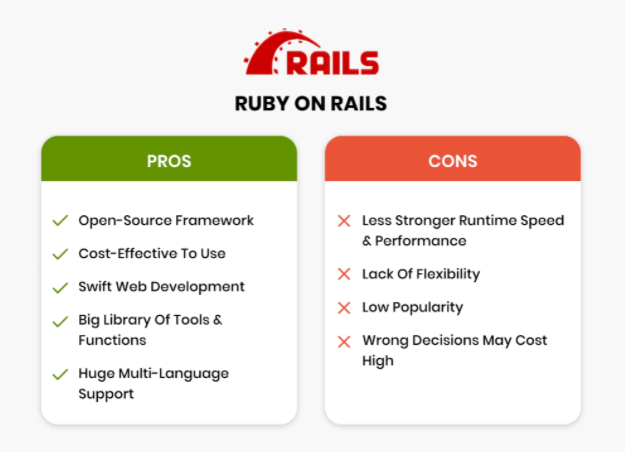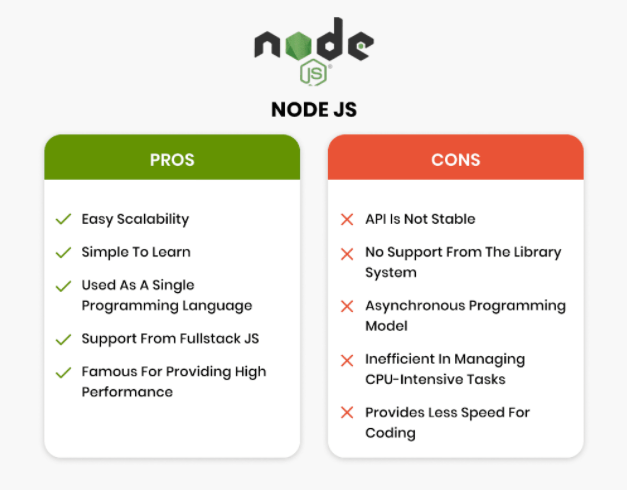June 17, 2021

Software Development Outsourcing
Ruby on Rails Vs Node.js: How to choose one?
What technology to use for a project? This is one of the most critical and difficult decisions to make when developing an application. Today, we will explore Ruby on Rails Vs Node.js in detail to help you understand these two technologies, how they differ, and when to choose one over the other.
Both web development technologies have their advantages and disadvantages, but both can support complex web applications. However, to make the best possible decision, you need to understand your development project and its end goals.
Ruby on Rails and Node.js Background
Comparing Node.js and Ruby on Rails is not entirely straightforward because they are two different development technologies. Ruby on Rails is a development framework that is based on the Ruby programming language. And Node.js is an open-source runtime environment that allows developers to run JavaScript code on the server-side.
Built on the Ruby programming language, Ruby on Rails ( RoR, or sometimes just “Rails”) is a fully-fledged website framework that includes everything you need to complete a website project, including the ability to manage logic routing and applications, all out of the box. These handy tools also include database integration and controllers, making it easier to facilitate web development on an end-to-end basis.
On the other hand, Node.js was released in 2009. Over time, Node.js has gained popularity among developers working on server-side scripts. Node.js allows you to develop web applications with a single programming language, JavaScript. It works with the JavaScript V8 engine of Google Chrome.
Now that you understand what Ruby on Rails and Node.js are let’s look at the specific benefits that each one offers to developers.
Ruby on Rails Advantages
There are many advantages to working with Ruby on Rails. Key benefits of using this development framework include:
- Fast development
- Scalability
- Simple database migration
- Large community
Fast development
One of the most significant advantages of RoR is that it was built for developing an application at high speed. It has many ready-made libraries (named gems) that allow constructing a web application in a short time. It also promotes writing code, which is really close to the natural English language, so it is easier to understand.
Furthermore, Ruby on Rails makes it easy for developers to implement multiple features at once by using the Model View Controller (MVC) architectural pattern and having different layers taken care of by various components in a very consistent manner across applications.
Scalability
This is one of the most critical aspects when developing a web application. Scalability is the ease at which a system can process increasing amounts of data over time.
The architecture of an RoR application has great scalability potential due to its modularity, which means the possibility to divide the system into engines, modules and gems. It also conforms very well to the twelve-factor app principles, which allows it to be scaled horizontally in a natural way.
This fact can be well appreciated whenever popular Platforms as a Service (Paas) such as Heroku help you scale the applications by just clicking a few buttons or interacting with simple slider control.
Simple database migration
Database migration can cause real headaches and take a lot of time. Ruby on Rails makes database migration effortless. Rails utilize ActiveRecord, which easily mitigates the discrepancies between multiple SQL interactions. Instead of taking valuable time to write out cumbersome SQL code, developers can use Ruby on Rails to describe the changes to their database tables. Plus, Rails works in a variety of database environments.
Large community
Ruby on Rails has been heavily focused on giving developers a clean, fun-to-use framework that is powerful and genuinely different from anything else. The community that grew around it and the abundance of resources they created only helped bolster its growth.
RoR has a huge community of experienced developers around it. It is vibrant, ever-growing and thousands of user-built gems make the development a breeze. This community has been getting better over the years, introducing many new features and making sure the whole ecosystem works flawlessly.

Node.js Pros
There are also many benefits to using the Node.js runtime for your development project. The key benefits of using Node.js include:
- Quick processing
- One language solution
- Open-source community
- Extensive Ecosystem
Quick processing
Node.js is best known for its speed. In part thanks to a combo of event-centric programming and programming that is out of sync. In addition, an exit entrance that avoids blockages. All of which maximizes the use of a single processor core and computer memory.
Sure enough, Node.js can handle more requests simultaneously and, by definition, the workload of many web servers. Furthermore, Node.js allows programs to keep running even with input and output demands when a server is high. As a result, maintain application performance regardless of load.
One language solution
With Node.js, you get the whole package since it is full-stack. It’s obvious what the advantage of this point is. If you code in only one language on both the front-end and server-side, you progress quicker. This is because Node.js came composed out of JavaScript. So, it’s easy to line up with front-end techniques to make effective second-gen web apps with less hassle. As a result, your team can be smaller and more efficient while also delivering faster results.
Open-Source community
One clear advantage is that Node.js is an open-source technology. It is not only about being free; it is also about the collaboration of highly creative and engaged developers from various corners of the world. For Node.js, there is no rigid money-oriented governance but a community with an intrinsic motivation to continuously build a product to be proud of.
Extensive ecosystem
New libraries are constantly being released for Node.js. This creates an extensive technology ecosystem for developers to work with. Currently, there are more than 800,000 libraries available for Node.js. This is a valuable resource for developers, and the large ecosystem of libraries available is one of the main reasons developers choose Node.js.

Projects best suited for Ruby on Rails
Rails is more capable of handling apps with many images, videos, and graphics since it is not a single-threaded environment like Node.js. If you’re also looking for rapid development, Ruby on Rails is the better choice. Node.js can be fast, too, thanks to its generator scripts, but it will never be as fast as Ruby on Rails in terms of development time.
If your project doesn’t require a lot of real-time functionality, Ruby on Rails is the way to go. Besides, it is a perfect option if you are limited in time and budget since the framework allows coders to move at a decently higher pace. Finally, Ruby on Rails will also be an absolute win-win option if you need to create a database-heavy project.
Projects best suited for Node.js
- Real-time applications: Node.js can power real-time applications (RTA) that process a high volume of short messages and require a minimal delay. For example, Yahoo, LinkedIn, and Uber are all built on Node.js.
- Data streaming: Considering its asynchronous nature, Node.js is also suitable for real-time streaming of media, streaming of data from various resources and apps that presuppose multiple file uploads. Netflix running on Node.js is a prominent example here.
- API servers: Another good application of Node.js is for creating an API server. This is because Node.js allows handling many concurrent connections simultaneously and efficiently converting JavaScript objects in JSON format.
- DevOps projects: As mentioned above, Node.js is perfect for writing fast and lightweight pieces of application – microservices – that allow development teams to build, deploy and maintain software at the same time. Continuous development and continuous integration are at the core of DevOps.
Final thoughts …
It can be challenging to make the comparison: Ruby on Rails vs Node.js. After all, one is a development framework, and the other is a runtime environment. Still, there are times when you may need to choose between Rails and Node.js. So, remember, before selecting a web development tool, take into account the goals and project requirements first.
And finally, whether you are a developer specialized in Ruby on Rails or Node.js, you are entirely welcome to start your journey in our Cafeto team!









